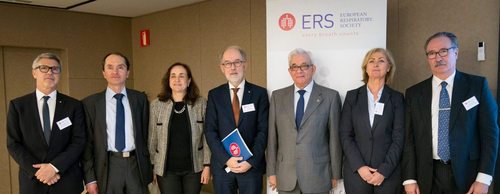The ERS Latin-American Working Group reunited on 27 March in Madrid for the launch of two reports on tobacco control in Iberian and Latin-American countries. They also presented recommendations to governments moving forwards.
The event, supported by several national and international societies, gathered more than 60 people, including policymakers from Spain and Latin America, health professionals and NGOs representatives.
The Chair of the ERS Tobacco Control Committee, Prof. Carlos Jimenez-Ruiz and Prof. Daniel Buljubasich, representative of the Latin-American Thoracic Society (ALAT) presented the main highlights of the two reports and the recommendations.
Among the policy guidelines presented, which are based on articles from the World Health Organization (WHO) Framework Convention on Tobacco control, were:
- the inclusion of the FCTC in national development priorities and its implementation as part of a coordination mechanism
- the increase of taxes for tobacco products
- the strengthening of smoke-free legislation
- The compliance with WHO FCTC Art. 5.3 on tobacco industry interference
- The adoption of plain packaging
- The development of smoking-cessation programmes
- The total ban on direct and indirect advertising and sponsorship of the tobacco industry
The Deputy-Director for Spanish Ministry of Health, Araceli Arce welcomed the reports and recommendations. She reaffirmed the importance of respiratory physicians to advocate on tobacco control.
Inmaculada Alfageme, president of the Spanish Society of Pneumology (SEPAR) launched a call to all professionals to be involved as tobacco control is an issue to be tackled at all levels.
During the conference, specific attention was given to four countries: Spain, Brazil, Portugal and Uruguay.
Prof. Carlos Jimenez-Ruiz and Dr. José-Ignacio de Granda, representative from SEPAR, highlighted that a lot more could be done in Spain, such as increasing taxes – dedicating the increase in state revenue to health purposes and prevention campaigns. This is already the case in Argentina, Colombia and Guatemala. They also emphasised the importance of adopting plain packaging as a means of reducing the number young people who take up smoking. They took the opportunity to congratulate Chilean stakeholders and policymakers who are currently pushing for the measure to be approved at the senate.
Prof. José-Miguel Chatkin, representative of the Brazilian Society of Pneumology, presented on the progress Brazil has made in tobacco control with the adoption of strong smoke-free legislation, advertising restrictions, tax increases and measures against illicit trade. These policies combined contributed significantly to a reduction in smoking prevalence for individuals aged 18 and above. However, a lot remains to be done including the need to regulate the use of water pipes and hookahs.
Dr. Ana Figueiredo, representative of the Portuguese Society of Pneumology, presented the tobacco control legislation in Portugal. Legislation in Portugal has many areas of exemption – particular in relation to smoke-free environments.
All speakers congratulated the Uruguayan example, in the presence of Dr. Francisco Bustillo, Ambassador of Uruguay to Spain and Dr. Eduardo Bianco, Director of the Framework Convention Alliance in the Americas. Uruguay has transitioned from having the third highest number (in Latin America) of young people exposed to tobacco smoke, to now being in second place in terms of having the healthiest air in enclosed spaces – bettered only by New Zealand.
Kerstin Schotte, representing WHO, highlighted that tobacco control in Latin-America is also a strong economic issue. The direct costs burdening Latin America´s health systems, as a result smoking, amount to approximately US$33 billion, equivalent to 7% of Latin-America's total annual spending on health. Among the countries most affected are Chile (0.86% of GDP), Bolivia (0.77% of GDP), and Argentina (0.70% of GDP).
Finally, Prof. Carlos Robalo Cordeiro, ERS Secretary General; Daniel Buljubasich, ALAT representative; and Francisco Rodriguez, the President of the European Network for Smoking and Tobacco Prevention (ENSP) emphasised how important it was for all stakeholders including medical societies, tobacco control NGOs and policymakers, to work together and exchange good practices to tackle the epidemic.
Closing the meeting, Dr. Jesus Sanchez Martos, Health Minister for Madrid commented on the importance of primary care in treating tobacco: “We are all committed to reducing tobacco consumption, not only by promoting healthy habits but also by helping any individuals who want to stop smoking”.
Visit the Facebook album for this event
View Spanish media coverage
- Access the first report on tobacco control in Iberian and Latin-American countries: English version, Spanish version, Portuguese version
- Access the second report on tobacco control in Iberian and Latin-American countries: English version, Spanish version
- Access the specific recommendations on tobacco control for Iberian and Latin-American governments: English version, Spanish version





